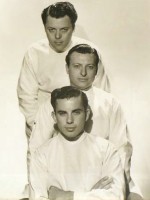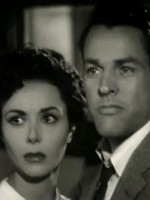Albert Maltz is a Actor and Scriptwriter American born on 28 october 1908 at New York City (USA)

Albert Maltz (October 28, 1908 – April 26, 1985) was an American playwright, fiction writer and screenwriter. He was one of the Hollywood Ten who were jailed in 1950 for their 1947 refusal to testify before the US Congress about their involvement with the US Communist Party. They and many other US entertainment industry figures were subsequently blacklisted, which denied Maltz employment in the industry for many years.
Born in Brooklyn, New York, Maltz was educated at Columbia University and the Yale School of Drama. During the 1930s, Maltz worked as a playwright for the Theater Union, which was "an organization of theater artists and political activists who mounted professional productions of plays oriented towards working people and their middle-class allies." In 1932, his play Merry Go Round was adapted for a film. At the Theater Union he met Margaret Larkin (1899–1967), whom he married in 1937. He won the 1938 O. Henry Award for "The Happiest Man on Earth", a short story published in Harper's Magazine.
In 1944 he published the novel The Cross and the Arrow, about which Jerry Belcher noted that it was "a best seller chronicling German resistance to the Nazi regime. It was distributed in a special Armed Forces edition to more than 150,000 American fighting men during World War II." In 1970 he published a collection of his short stories Afternoon in the Jungle.
Maltz' first screenwriting credit was for This Gun for Hire (1942). He worked regularly as a screenwriter until his blacklisting; his last assignment for some years was The Robe (1953), although he didn't receive a credit until decades later. In 1960, Frank Sinatra engaged Maltz to write a screenplay for The Execution of Private Slovik, but in the end Sinatra was pressured into dismissing Maltz from the project. Maltz was finally employed again on Two Mules for Sister Sara (1970), which was a vehicle for the popular actors Clint Eastwood and Shirley MacLaine. His last credit (as John B. Sherry) is for Hangup (1974).
For his script for the 1945 film Pride of the Marines, Maltz was nominated for an Academy Award for Writing Adapted Screenplay. His screenplay for Broken Arrow won the 1951 Writers Guild of America Award for Best Written American Western. However, due to his blacklisting at the time, fellow MPAA screenwriter Michael Blankfort agreed to put his own name on the script in place of Maltz's as the only way to get it accepted by any of the Hollywood movie studios, and as such, Blankfort was named the winner. In 1991, in the course of correcting screen credits for blacklisted screenwriters, the Writers Guild of America officially recognized Maltz as the only credited screenwriter for Broken Arrow.
In 1978, Jack Salzman published a biography of Maltz.
Ses plus belles réussites sont au début de sa carrière, notamment avec Tueur à gages (This Gun for Hire) de Frank Tuttle (1942), L'Orgueil des marines (Pride of the Marines) de Delmer Daves (1945), et Cape et Poignard (Cloak and Dagger) de Fritz Lang (1946), où ses qualités d'écriture et ses idées sont les mieux représentées.
 (1953)
(1953)
(Scriptwriter) (1945)
(1945)
(Scriptwriter) (1948)
(1948)
(Scriptwriter)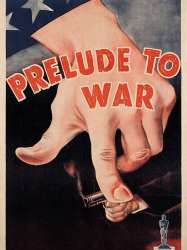 (1942)
(1942)
(Scriptwriter)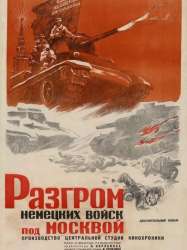 (1942)
(1942)
(Scriptwriter)
Source : Wikidata
Albert Maltz

- Infos
- Photos
- Best films
- Family
- Characters
- Awards
Nationality USA
Birth 28 october 1908 at New York City (USA)
Death 26 april 1985 (at 76 years) at Los Angeles (USA)
Birth 28 october 1908 at New York City (USA)
Death 26 april 1985 (at 76 years) at Los Angeles (USA)
Albert Maltz (October 28, 1908 – April 26, 1985) was an American playwright, fiction writer and screenwriter. He was one of the Hollywood Ten who were jailed in 1950 for their 1947 refusal to testify before the US Congress about their involvement with the US Communist Party. They and many other US entertainment industry figures were subsequently blacklisted, which denied Maltz employment in the industry for many years.
Born in Brooklyn, New York, Maltz was educated at Columbia University and the Yale School of Drama. During the 1930s, Maltz worked as a playwright for the Theater Union, which was "an organization of theater artists and political activists who mounted professional productions of plays oriented towards working people and their middle-class allies." In 1932, his play Merry Go Round was adapted for a film. At the Theater Union he met Margaret Larkin (1899–1967), whom he married in 1937. He won the 1938 O. Henry Award for "The Happiest Man on Earth", a short story published in Harper's Magazine.
In 1944 he published the novel The Cross and the Arrow, about which Jerry Belcher noted that it was "a best seller chronicling German resistance to the Nazi regime. It was distributed in a special Armed Forces edition to more than 150,000 American fighting men during World War II." In 1970 he published a collection of his short stories Afternoon in the Jungle.
Maltz' first screenwriting credit was for This Gun for Hire (1942). He worked regularly as a screenwriter until his blacklisting; his last assignment for some years was The Robe (1953), although he didn't receive a credit until decades later. In 1960, Frank Sinatra engaged Maltz to write a screenplay for The Execution of Private Slovik, but in the end Sinatra was pressured into dismissing Maltz from the project. Maltz was finally employed again on Two Mules for Sister Sara (1970), which was a vehicle for the popular actors Clint Eastwood and Shirley MacLaine. His last credit (as John B. Sherry) is for Hangup (1974).
For his script for the 1945 film Pride of the Marines, Maltz was nominated for an Academy Award for Writing Adapted Screenplay. His screenplay for Broken Arrow won the 1951 Writers Guild of America Award for Best Written American Western. However, due to his blacklisting at the time, fellow MPAA screenwriter Michael Blankfort agreed to put his own name on the script in place of Maltz's as the only way to get it accepted by any of the Hollywood movie studios, and as such, Blankfort was named the winner. In 1991, in the course of correcting screen credits for blacklisted screenwriters, the Writers Guild of America officially recognized Maltz as the only credited screenwriter for Broken Arrow.
In 1978, Jack Salzman published a biography of Maltz.
Biography
Albert Maltz se fait d'abord connaître à Broadway comme dramaturge avant de s'installer à Hollywood en 1942. Politiquement très engagé à gauche, Maltz fit partie des Dix d'Hollywood qui furent victimes du maccarthysme. Après La Cité sans voiles (The Naked City), de Jules Dassin en 1948, son nom disparaît des génériques jusqu'en 1970, année de la sortie de Sierra torride (Two Mules for Sister Sara), de Don Siegel.Ses plus belles réussites sont au début de sa carrière, notamment avec Tueur à gages (This Gun for Hire) de Frank Tuttle (1942), L'Orgueil des marines (Pride of the Marines) de Delmer Daves (1945), et Cape et Poignard (Cloak and Dagger) de Fritz Lang (1946), où ses qualités d'écriture et ses idées sont les mieux représentées.
Best films
 (1953)
(1953)(Scriptwriter)
 (1945)
(1945)(Scriptwriter)
 (1948)
(1948)(Scriptwriter)
 (1942)
(1942)(Scriptwriter)
 (1942)
(1942)(Scriptwriter)
Usually with
Filmography of Albert Maltz (25 films)
Actor

Hollywood on Trial (1976)
, 1h45Origin USA
Genres Documentary, Historical
Themes Documentary films about business, Documentary films about the film industry, Documentary films about historical events, Documentary films about cities, Political films
Actors John Huston, Walter Bernstein, Alvah Bessie, Lester Cole, Gary Cooper, Henry Daniell
Roles Himself
Rating72%





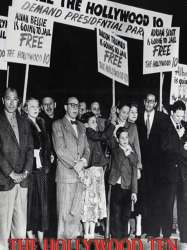
The Hollywood Ten (1950)
, 15minutesDirected by John Berry
Origin USA
Genres Documentary
Themes Documentary films about historical events, Documentary films about politics, Political films
Actors Alvah Bessie, Herbert J. Biberman, Dalton Trumbo, Lester Cole, Edward Dmytryk, Albert Maltz
Roles Self
Rating71%





Scriptwriter

The Beguiled (2017)
, 1h31Directed by Sofia Coppola
Origin USA
Genres Drama, Thriller, Western
Actors Colin Farrell, Nicole Kidman, Kirsten Dunst, Elle Fanning, Oona Laurence, Angourie Rice
Roles Original Film Writer
Rating62%





En Virginie en 1864, alors que la guerre de Sécession fait rage, le pensionnat pour jeunes filles tenu par Martha Farnsworth demeure totalement en dehors des conflits. Mais un jour, le pensionnat recueille un soldat, gravement blessé.
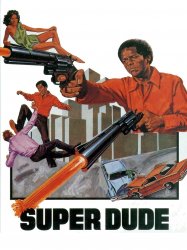
Hangup (1974)
, 1h34Directed by Henry Hathaway
Origin USA
Genres Drama, Action
Actors Cliff Potts, Marki Bey, Barbara Baldavin, William Bramley, Bob Delegall, Midori
Roles Writer
Rating56%






Scalawag (1973)
, 1h32Directed by Kirk Douglas
Origin Italie
Genres Adventure, Western
Themes Seafaring films, Transport films, Pirate films
Actors Mark Lester, Neville Brand, Kirk Douglas, George Eastman, Lesley-Anne Down, Don Stroud
Roles Writer
Rating51%





Un pion pirate jambes est à la recherche d'un trésor à l'aide d'un jeune garçon, fille de l'adolescence et un perroquet. Ils doivent se battre Natives et son ancien équipage sur le chemin.

The Beguiled (1971)
, 1h45Directed by Don Siegel
Origin USA
Genres Drama, War, Thriller, Horror, Romance, Erotic thriller, Western
Themes Films about families, Films about sexuality, Rape in fiction, Bisexuality-related films, Erotic films, LGBT-related films, Films about disabilities, Political films, Erotic thriller films, LGBT-related films, LGBT-related film
Actors Clint Eastwood, Geraldine Page, Elizabeth Hartman, Jo Ann Harris, Darlene Carr, Darleen Carr
Rating71%





Close to the end of the American Civil War, injured Yankee soldier John McBurney is rescued from the verge of death by a twelve-year-old girl from an all-girl boarding school in Louisiana. At first the all-female staff and pupils are scared, but as John starts to recover, he charms them one by one and the sexually repressed atmosphere becomes filled with jealousy and deceit, with the two teachers and some of the girls clearly attracted to him.

Two Mules for Sister Sara (1970)
, 1h53Directed by Don Siegel
Origin USA
Genres War, Comedy, Action, Adventure, Romance, Western
Themes French war films, Political films
Actors Shirley MacLaine, Clint Eastwood, Alberto Morin, Armando Silvestre, Manolo Fábregas, Ada Carrasco
Rating69%





A drifter named Hogan spots and saves a naked woman from being gang-raped by several bandits whom he shoots and kills. He later learns that the woman, Sara, is a nun working with a group of Mexican revolutionaries who are fighting the French. When Sara requests that Hogan take her to a Mexican camp, he agrees because he had previously arranged to help the Mexican revolutionaries attack the French garrison in exchange for a portion of the garrison's strongbox if they are successful.

The Last Challenge (1967)
, 1h45Directed by Richard Thorpe
Origin USA
Genres Western
Actors Glenn Ford, Angie Dickinson, Chad Everett, Gary Merrill, Jack Elam, Delphi Lawrence
Roles Novel
Rating60%





Depuis qu'il a décidé de passer du côté de la loi, le shérif Dan Blaine fait tout pour oublier son passé de pistolero. Pourtant, sa réputation de fin tireur attire l'attention de jeunes hors-la-loi qui aimeraient se mesurer à lui dans un duel. Cette même ambition pousse Lot McGuire à s'installer dans la ville. Malgré la solide amitié qui s'est construite entre le shérif et le jeune voyou et les multiples tentatives de Lisa, la propriétaire du saloon, pour l'empêcher, le duel a finalement lieu...

The Last Challenge (1967)
, 1h45Directed by Richard Thorpe
Origin USA
Genres Western
Actors Glenn Ford, Angie Dickinson, Chad Everett, Jack Elam, Robert Horton, Kevin Hagen
Roles Novel
Rating60%





A cocky young man from Tennessee, Lot McGuire (Chad Everett), seeks to back up his notion that he's the fastest gun there is. "If a man is second best, he might as well be dead," says McGuire. He travels to a town with the intention of forcing a duel with Marshal Dan Blaine (Ford), who's renowned for his skill with a gun.

Short Cut to Hell (1957)
, 1h29Directed by James Cagney
Origin USA
Genres Drama, Thriller, Crime
Actors Georgann Johnson, Murvyn Vye, Peter Baldwin, Jacques Aubuchon, Richard Hale, Milton Frome
Rating59%





Kyle Niles, un tueur à gages, est embauché par une de ses connaissances pour abattre deux hommes. Il accepte, et, après avoir accompli son travail, il reçoit le salaire dû. Mais il ignore que l'argent qu'il touche est celui d'un hold-up, et que chaque numéro de billet est connu par la police. Pris en tenaille, Kyle enlève la fiancée du policier qui le poursuit, afin de couvrir sa fuite...
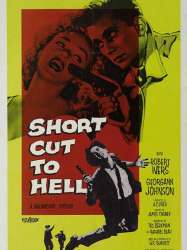
Short Cut to Hell (1957)
, 1h29Directed by James Cagney
Origin USA
Genres Drama, Thriller, Crime
Actors Georgann Johnson, Murvyn Vye, Jacques Aubuchon, Peter Baldwin, Richard Hale, Milton Frome
Rating59%





Professional hitman Kyle Niles (Ivers) is hired to commit two murders and afterwards double-crossed by his employer Bahrwell (Aubuchon). Seeking revenge, Kyle kidnaps singer Glory Hamilton (Johnson), the girlfriend of the police detective in charge of his pursuit (Bishop). Kyle is finally able to get even with Bahrwell, and in the process reveals his long-dormant "good" side.
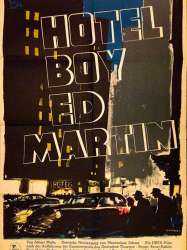
Hotelboy Ed Martin (1955)
Genres Drama
Actors Ulrich Thein, Katharina Matz, Werner Pledath, Theo Shall
Roles Story

The Robe (1953)
, 2h15Directed by Henry Koster
Origin USA
Genres Drama, Historical, Peplum
Themes Films set in Africa, Films about religion, Films based on the Bible, Portrayals of Jesus in film, Children's films
Actors Richard Burton, Jean Simmons, Victor Mature, Michael Rennie, Jay Robinson, Dean Jagger
Rating67%





The action takes place in Ancient Rome, Judaea, Capri, and Galilee in a time period stretching from A.D. 32 to A.D. 38

Broken Arrow (1950)
, 1h28Directed by Delmer Daves
Origin USA
Genres Action, Romance, Western
Themes Children's films
Actors James Stewart, Jeff Chandler, Debra Paget, Will Geer, Arthur Hunnicutt, Iron Eyes Cody
Rating70%





Tom Jeffords (James Stewart) comes across a wounded, 14-year-old Apache boy dying from buckshot wounds in his back. Jeffords gives the boy water and heals his wounds. The boy's tribesmen appear and are at first hostile, but decide to let Jeffords go free. However, a group of gold prospectors happens by, and the Apache gag Jeffords and tie him to a tree. Helpless, he watches as they attack the prospectors and torture the survivors. The warriors then let him go but warn him not to enter Apache territory again.

The Naked City (1948)
, 1h36Directed by Jules Dassin
Origin USA
Genres Drama, Thriller, Documentary, Noir, Crime
Actors Barry Fitzgerald, Howard Duff, Don Taylor, Ted de Corsia, David Opatoshu, James Gregory
Rating74%





In the late hours of a hot New York summer night, a pair of men subdue and kill Jean Dexter, an ex-model, by knocking her out with chloroform and drowning her in her bathtub. When one of the murderers, conscience-stricken, gets drunk, the other kills him, then lifts his body into the air and throws it into the East River.
 Connection
Connection

